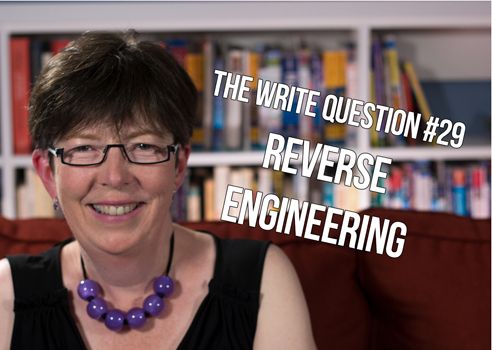Viewing time: 3 mins. 48 secs.
The Write Question is a weekly video podcast about writing that I started in 2017 and that ran, more or less weekly, until April 2022. This is a republication of issue #29, describing reverse engineering for writers. The post first ran on Aug. 25/17.
Transcript:
Welcome to The Write Question, I’m Daphne Gray-Grant. If you’re a writer, math and science may hold a particular terror for you. But I’m going to try to persuade to embrace your inner engineer.
Today’s question comes from Judith Benz, an academic based in Huntingdon, Pennsylvania. Let’s hear what she’s asked:
[recording] Hi Daphne, I was wondering if you can offer me some advice regarding the following: I find I have a hard time managing writing projects of say three months. I seem to plug away at the task every day but all of sudden the deadline has crept up on me and I’m nowhere near finished. Thank you for your feedback.
Thanks for the question, Judith. Twenty-five years ago, when I was a journalist in daily newspapers, a three-month deadline sounded like an unimaginable luxury. I was lucky if I got three hours!
Today, however, I’m self-employed and doing a slightly different kind of work and I face longer term deadlines all the time. And I now understand they are not as easy as they look. It’s so tempting to delay and procrastinate! Even worse, it’s so easy to work incredibly hard and STILL not finish on time.
When I edited a book 25 years ago, I learned the trick of reverse engineering. It has saved me so many times.
So how do you do it? Start by writing down the date of your ultimate deadline. Then go two days before that, and consider this your actual deadline. These extra two days are designed to give you a cushion if anything goes wrong. But be sure to treat this new day as the “real” deadline.
Next, figure out every step you have to take before finishing the project. This list of things to do will be slightly different for everyone, but let me show you what my list looks like:
- Think about the project
- Read and do research
- Mindmap
- Write a crappy first draft
- Let the draft incubate (at least two days)
- Edit the crappy first draft
- Share the revised draft with colleagues to get feedback
- Do a final edit, incorporating feedback
- Do a copy edit (checking spelling, grammar etc.)
- And finally, do a last proofread, looking for typos
Now, here’s the reverse engineering part — turn your list upside down and attach a deadline to every task. Before you can do this you must also sort out how much time you’re going to need to devote to each step. After all of that, your list might look something like this.
- Do final proofread, looking for typos [1 day: Aug 18]
- Do copy edit (checking spelling, grammar etc.) [1 day: Aug 17]
- Do final edit, incorporating feedback [1 week: Aug 10 to 17]
- Share revised draft with colleagues for feedback [3 weeks: July 20 – Aug 17]
- Edit crappy first draft [3 weeks: June 29 to July 20]
- Let draft incubate (at least two days) [June 27 to 29]
- Write a crappy first draft [two weeks: June 13 to June 27]
- Mindmap [one day: June 12]
- Read and do research [2 weeks: May 29 to June 12]
- Think about the project [1 week: May 22 to May 29]
The reason reverse engineering works is because it holds you accountable throughout the process. Without regular deadlines for a project like this, I wouldn’t have felt any anxiety which would have been good. But I might not have had any urgency, which would have been bad.
If you’re failing to accomplish steps along the way, this timetable will make you aware of this problem. Then, you’ll be able to make decisions that will still help you meet the ultimate deadline. Maybe you need to tighten your focus or otherwise cut some corners? Maybe you need to devote more daily time to this project. If you reverse engineer your project early enough in the process your life will be easier and the material you’re writing will be better.
Finally, while we’re on the subject of reverse engineering, let me wrap up with a quote from noted cognitive scientist and popular author Steven Pinker: “Writers acquire their technique by spotting, savoring, and reverse-engineering examples of good prose.”
Thanks for your question, Judith. Good luck with building your project from the ground up!


